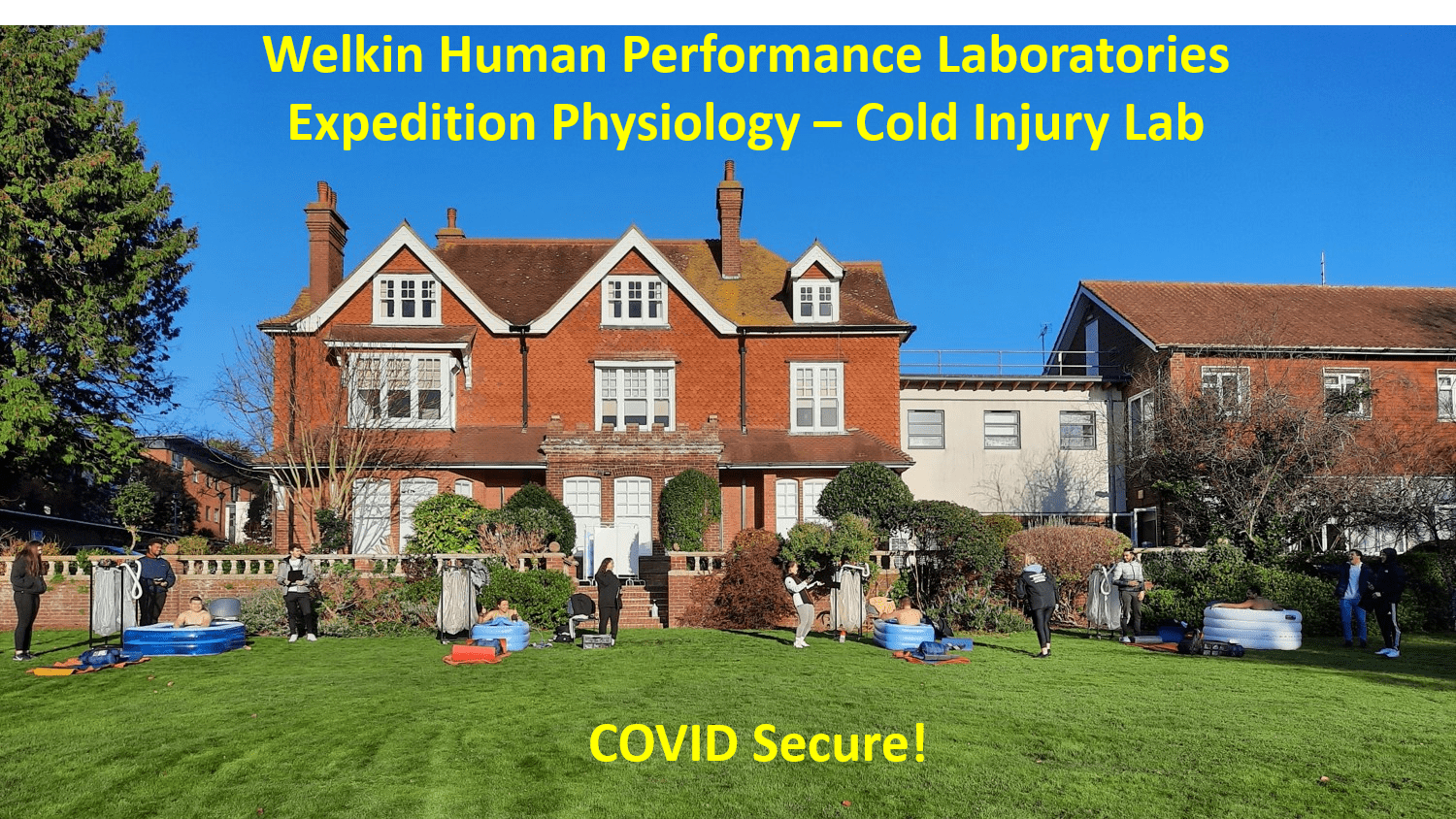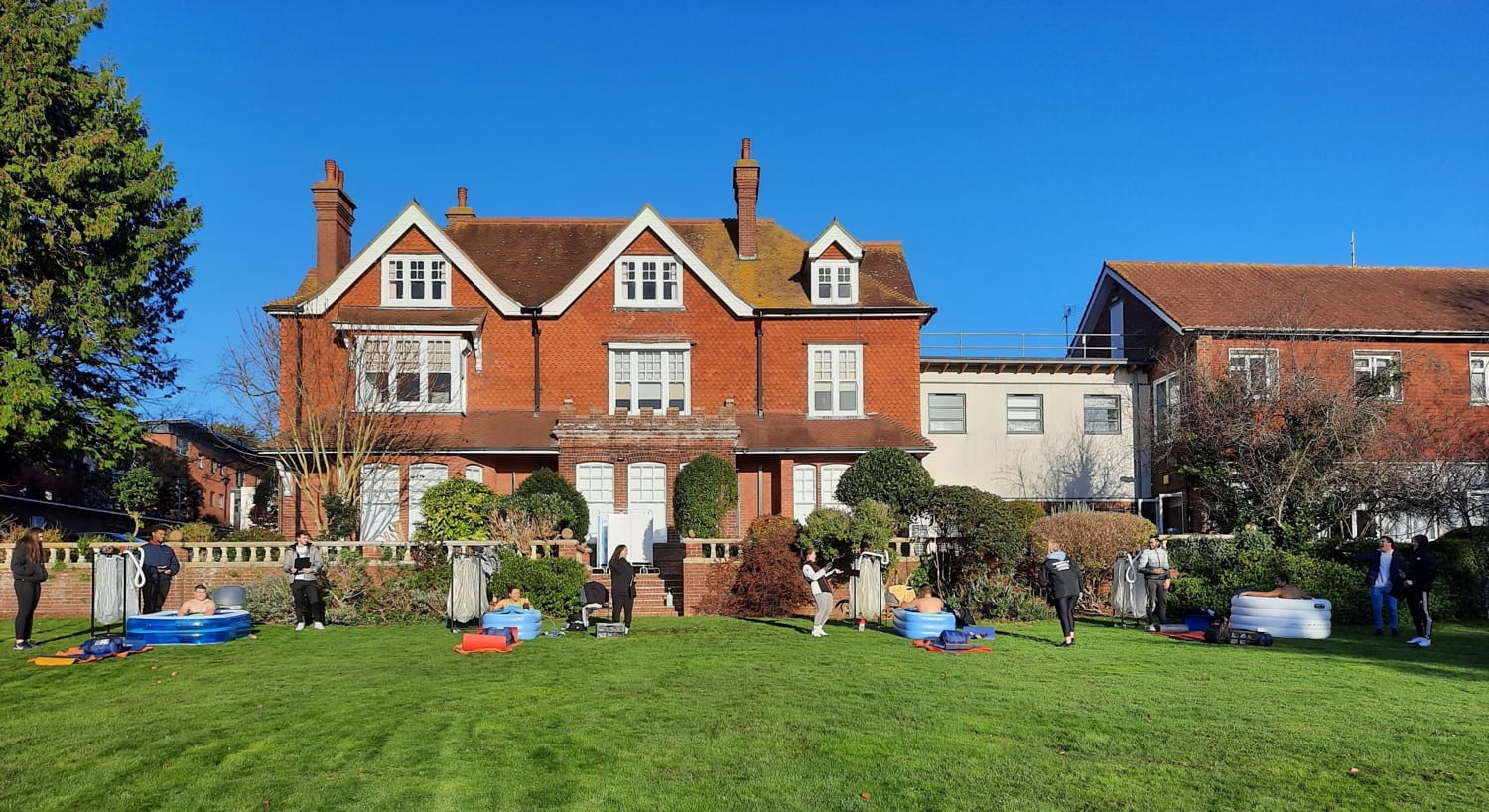 What a year! For obvious reasons linked to COVID, it has been over 8 months since our last Environmental Extremes Lab post of our support to the Dhiman Brothers, but we have still been very active behind the scenes in our teaching and research. As we thankfully close the door on 2020, hoping that 2021 will be better, a quick round-up of some of the activities we have been involved in and few tasters of what is to come!
What a year! For obvious reasons linked to COVID, it has been over 8 months since our last Environmental Extremes Lab post of our support to the Dhiman Brothers, but we have still been very active behind the scenes in our teaching and research. As we thankfully close the door on 2020, hoping that 2021 will be better, a quick round-up of some of the activities we have been involved in and few tasters of what is to come!
Teaching Environmental Extremes
Despite our Environmental Physiology Laboratory being transformed into a COVID decontamination room, it did not stop us, with a big help from our Technicians – James Bovington and EEL member Bill Norton, from thinking outside the box in how to inspire our students. As part of the 3rd year Expedition Physiology module, Dr Neil Maxwell led the students to:
- compare two rewarming techniques [one endogenous heating method – i.e. own heat from a sleeping bag) and one endogenous+exogenous method – i.e. own heat and hypothermic wrap with heat packs in the neck, armpits, groin and hands)] that might be available to students ‘on the hill’ in their ability to recover core temperature following cold exposure to identify a preferred rewarming approach; and
- investigate whether an individual’s somatotype and/or cold-induced vasodilation response determines the efficacy of the rewarming method following cold exposure.
As can be seen from the photos, to maintain social distancing and reduce risk of COVID transmission, the lab was outside. Do not be fooled though by what looks like gorgeous weather. It may have been sunny, but it was 3°C in the shade, where participants were for part of the cooling (water and air) and rewarming. The Friday Group were not so lucky as they cooled and rewarmed in the rain! We believe that teaching how to deal with accidental hypothermia is a life skill and the students certainly got a good, if not a little chilly experience of that!



Dr Alan Richardson had the Expedition Physiology students also study the topical question of whether face masks that we have all become use to in our daily lives, cause hypoxemia, alter cardiovascular function and even exercise performance. In our Performing in Environmental Extremes 2nd Year module, Dr Maxwell led our students to look at the efficacy of the FDBRO Sports Training Mask to simulate altitude, while Dr Mark Hayes examined the dive reflex and breath holding ability of our students. No one beat our breath holding record of former PhD student and lecturer, Dr Paul Castle of 4 min and 3 s!
So you can see life and labs have continued, albeit in a different way. The labs underwent a thorough risk assessment, with user-friendly documents and videos being made to disseminate the new practice. Thankfully, we had no cases of COVID-19 that could be traced back to any of our lab practical classes and I think this is testament to the staff (Academic, Technical Instructors and Technicians) and students’ commitment to being COVID-secure.
Some new studies published in 2020
Bonell, A., Hirst, J., Vicedo-Cabrera, A., Haines, A., Prentice, A. & Maxwell, N. (2020). A protocol for an observational cohort study of heat strain and its effect on fetal wellbeing in pregnant farmers in The Gambia. Wellcome Open Research, 5, 32.
Garrett, A., Maxwell, N., Periard, J. & Sunderland, C. (2020). Editorial: Heat Acclimation for Special Populations, Frontiers in Physiology, doi.org/10.3389/fphys.2020.00895.
Relf, R., Eichhorn, G., Waldock, K., Flint, M., Beale, L. and Maxwell, N. (2020). Validity of a wearable sweat rate monitor and routine sweat analysis techniques using heat acclimation. Journal of Thermal Biology, 90, 8, doi.org/10.1016/j.jtherbio.2020.102577.
Watkins, E., Hayes, M., Renshaw, D., Watt, P and Richardson, A. (2020). Extreme occupational heat exposure is associated with elevated haematological and inflammatory markers in Fire Service Instructors. Experimental Physiology, doi.org/10.1113/EP088386.
Willmott, A.G.B, Holliss, R., Saynor, Z., Corbett, J., Causer, A.J. and Maxwell, N.S. (2020). Heat acclimation improves sweat gland function and lowers sweat sodium concentration in an adult with cystic fibrosis. Journal of Cystic Fibrosis, doi: 10.1016/j.jcf.2020.07.013.
Dr Neil Maxwell also had the opportunity to join the steering committee of the British Association of Sport and Exercise Sciences COVID-19 Special Interest Group that led to three commissioned reports, one to a House of Commons Select Committee on what can be done to secure the future of sport in our communities. Neil was able to cite Kirsty Waldock’s research study into the effect of heat stress (with emphasis towards heat waves) on the physiological and perceptual responses and daily living activities in the elderly. As we move into the spring and summer months next year, although we want to encourage exercise, physical activity campaigns need to recognise the greater risk the elderly are at of incurring a heat-related illness. Therefore, consistent public health campaigns are essential to avoid ambiguous messaging, adherence to exercise while not increasing risk amongst vulnerable populations.
Smith, A., de Oliveira, R., Faghy, M., Ross, M. and Maxwell, N. (2020). Re-opening of Sport and Exercise Science Departments in Higher Education after lockdown. British Association of Sport and Exercise Sciences Newsletter, August.
Smith, A., de Oliveira, R., Faghy, M., Ross, M. and Maxwell, N. (2020). Reflecting on re-opening? You are not alone. British Association of Sport and Exercise Sciences Newsletter, November.
Smith, A., de Oliveira, R., Faghy, M., Ross, M., Maxwell, N. and Broom, D. (2020). BASES evidence to the House of Commons Digital Culture, Media and Sport Select Committee on an inquiry of sport in our communities.
New, Existing and Exiting PhD Students
I am really pleased to welcome Chanel Coppard back to the University of Brighton and the Environmental Extremes Lab from March 2021, where she will commence her PhD investigating ‘the effect of thermoregulatory factors that impact health-related quality of life in female breast cancer survivors’. Chanel studied her BSc and MSc degree with us and in her MSc research project looked at female breast cancer survivors and heat exposure and specifically the impact on heat-related quality of life. So, she will be extending this excellent work and the research that Rebecca Relf has been completing over the last few years. Rebecca moves into her final year of her PhD in 2021, having collected all her data and now writing up her thesis. A really nice study of the heat reactions between breast cancer survivors and age-matched controls is just about to be submitted for publication, with some nice collaboration between Associate Professor Ben Lee and EEL, so watch this space!
Dr Ana Bonell from the London School of Hygiene and Tropical Medicine, who Dr Maxwell supervises, had to cut short her large scale investigation into the effect of climate and exercise on pregnancy and pregnancy outcome due to the pandemic (98 rather than the 120 participants planned!). Fortunately, the Wellcome Trust who support her clinical PhD programme, allowed the remaining funds to be directed to a very important ‘evaluation of heat alleviation strategies in healthcare workers wearing personal protective equipment’ who were supporting the fight against the pandemic in The Gambia.
It was with immense pride, although with a touch of sadness due to her leaving the University of Brighton, that Kirsty Waldock was awarded her PhD – Optimising heat illness prevention strategies for the elderly population. This blog post cannot do justice to what Kirsty brought to the team and it was way more than just a big laugh! Kirsty’s work (ethic and ability) with the elderly and looking at heat reactions and heat mitigating strategies has already been hugely impactful. It is hoped that two more publications from her thesis will come out early in 2021 to add to the story. An audience with Public Health England is looming! Gregor Eichhorn is continuing this story around cellular responses to exercise-heat stress in the elderly in his own PhD and we look forward to having him back on campus when restrictions allow. However, we are really pleased that the MOD saw in Kirsty what we did and she is now a Scientific Officer working in thermal physiology. Well done Kirsty on the journey so far!
- Raise Awareness regarding health risks and dangers when travelling at Altitude worldwide
- Promote and provide education on safe travel at Altitude
- Promote and support research into the causes of Altitude Illnesses
- trainSharp Cycling Online Physiology Consensus Statements
- International Paralympic Committee Online Heat Mitigation Resources for Tokyo 2021
- Lands’ End to John O’Groats Challenge
- Ski the 7 Summits Project
- Marathon des Sables Heat Acclimation Support
- Para-Monte Altitude Awareness
- Heat Wave Health Plan for University of Brighton

Thanks EEL for your support through the year(s).
We @ Para-Monte look forward to our future collaboration together in 2021.
Wishing you all a great Christmas break and sounds like an exciting New Year.
Best Wishes
Para-Monte Trustees.